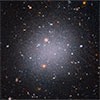 Finding a galaxy lacking dark matter is an extraordinary claim that challenges conventional wisdom. It would have the potential to upset theories of galaxy formation and evolution.
Finding a galaxy lacking dark matter is an extraordinary claim that challenges conventional wisdom. It would have the potential to upset theories of galaxy formation and evolution.
Jun 17th, 2021
Read more
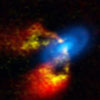 New observations of young stellar object Elias 2-27 confirm gravitational instabilities and planet-forming disk mass as key to formation of giant planets.
New observations of young stellar object Elias 2-27 confirm gravitational instabilities and planet-forming disk mass as key to formation of giant planets.
Jun 17th, 2021
Read more
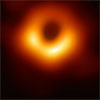 How do supermassive black holes in the early universe originate? Scientists have come up with an explanation: a massive seed black hole that the collapse of a dark matter halo could produce.
How do supermassive black holes in the early universe originate? Scientists have come up with an explanation: a massive seed black hole that the collapse of a dark matter halo could produce.
Jun 16th, 2021
Read more
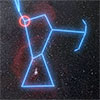 The red supergiant Betelgeuse - best known for being in Orion's armpit - has recently gone through what astronomers have named the 'Great Dimming', where the otherwise very bright star has become darker and cloudy. International researchers say that it's darkened state is likely the result of a toot of dust and gas that originated in a cool spot in the star's southern hemisphere.
The red supergiant Betelgeuse - best known for being in Orion's armpit - has recently gone through what astronomers have named the 'Great Dimming', where the otherwise very bright star has become darker and cloudy. International researchers say that it's darkened state is likely the result of a toot of dust and gas that originated in a cool spot in the star's southern hemisphere.
Jun 16th, 2021
Read more
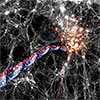 By mapping the motion of galaxies in huge filaments that connect the cosmic web, astronomers have found that these long tendrils of galaxies spin on the scale of hundreds of millions of light years. A rotation on such enormous scales has never been seen before.
By mapping the motion of galaxies in huge filaments that connect the cosmic web, astronomers have found that these long tendrils of galaxies spin on the scale of hundreds of millions of light years. A rotation on such enormous scales has never been seen before.
Jun 14th, 2021
Read more
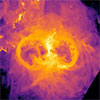 The cosmic mass monsters clear the way for the formation of new suns in satellite galaxies.
The cosmic mass monsters clear the way for the formation of new suns in satellite galaxies.
Jun 11th, 2021
Read more
 Astronomers observed the star decreasing in brightness by a factor of 30, so that it nearly disappeared from the sky. While many stars change in brightness because they pulsate or are eclipsed by another star in a binary system, it's exceptionally rare for a star to become fainter over a period of several months and then brighten again.
Astronomers observed the star decreasing in brightness by a factor of 30, so that it nearly disappeared from the sky. While many stars change in brightness because they pulsate or are eclipsed by another star in a binary system, it's exceptionally rare for a star to become fainter over a period of several months and then brighten again.
Jun 11th, 2021
Read more
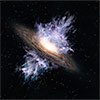 Researchers discovered a titanic galactic wind driven by a supermassive black hole 13.1 billion years ago. This is the earliest-yet-observed example of such a wind to date and is a telltale sign that huge black holes have a profound effect on the growth of galaxies from the very early history of the Universe.
Researchers discovered a titanic galactic wind driven by a supermassive black hole 13.1 billion years ago. This is the earliest-yet-observed example of such a wind to date and is a telltale sign that huge black holes have a profound effect on the growth of galaxies from the very early history of the Universe.
Jun 11th, 2021
Read more
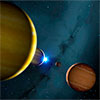 Four planets locked in a perfect rhythm around a nearby star are destined to be pinballed around their solar system when their sun eventually dies.
Four planets locked in a perfect rhythm around a nearby star are destined to be pinballed around their solar system when their sun eventually dies.
Jun 11th, 2021
Read more
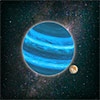 The moons of planets that have no parent star can possess an atmosphere and retain liquid water. Astrophysicists have calculated that such systems could harbor sufficient water to make life possible - and sustain it.
The moons of planets that have no parent star can possess an atmosphere and retain liquid water. Astrophysicists have calculated that such systems could harbor sufficient water to make life possible - and sustain it.
Jun 10th, 2021
Read more
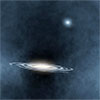 Even though these objects are thousands of millions of times smaller than their host galaxies our current view is that the Universe can be understood only if the evolution of galaxies is regulated by the activity of these black holes, because without them the observed properties of the galaxies cannot be explained.
Even though these objects are thousands of millions of times smaller than their host galaxies our current view is that the Universe can be understood only if the evolution of galaxies is regulated by the activity of these black holes, because without them the observed properties of the galaxies cannot be explained.
Jun 9th, 2021
Read more
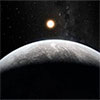 An international group of collaborators have discovered a new, temperate sub-Neptune sized exoplanet with a 24-day orbital period orbiting a nearby M dwarf star. The recent discovery offers exciting research opportunities thanks to the planet's substantial atmosphere, small star, and how fast the system is moving away from the Earth.
An international group of collaborators have discovered a new, temperate sub-Neptune sized exoplanet with a 24-day orbital period orbiting a nearby M dwarf star. The recent discovery offers exciting research opportunities thanks to the planet's substantial atmosphere, small star, and how fast the system is moving away from the Earth.
Jun 9th, 2021
Read more
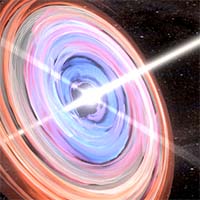 A research group has revealed more about the lifespan of supermassive black holes. They accidentally caught a bright phase AGN signal from the Arp 187 galaxy with no signal from the nucleus.
A research group has revealed more about the lifespan of supermassive black holes. They accidentally caught a bright phase AGN signal from the Arp 187 galaxy with no signal from the nucleus.
Jun 8th, 2021
Read more
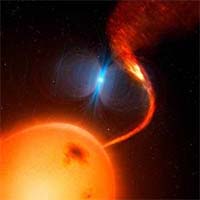 Researchers have identified the first eclipsing magnetic propeller in a cataclysmic variable star system.
Researchers have identified the first eclipsing magnetic propeller in a cataclysmic variable star system.
Jun 7th, 2021
Read more
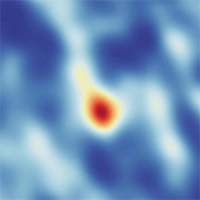 This is the earliest epoch in the universe for which there is a measurement of the atomic hydrogen content of galaxies. The new result is a crucial confirmation of the group's earlier result, where they had measured the atomic hydrogen content of galaxies 8 billion years ago, and pushes our understanding of galaxies to even earlier in the universe.
This is the earliest epoch in the universe for which there is a measurement of the atomic hydrogen content of galaxies. The new result is a crucial confirmation of the group's earlier result, where they had measured the atomic hydrogen content of galaxies 8 billion years ago, and pushes our understanding of galaxies to even earlier in the universe.
Jun 7th, 2021
Read more
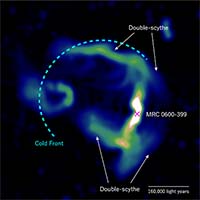 Radio telescope images enable a new way to study magnetic fields in galaxy clusters millions of light years away.
Radio telescope images enable a new way to study magnetic fields in galaxy clusters millions of light years away.
Jun 1st, 2021
Read more
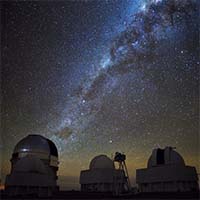 New results from the Dark Energy Survey use the largest ever sample of galaxies over an enormous piece of the sky to produce the most precise measurements of the universe's composition and growth to date.
New results from the Dark Energy Survey use the largest ever sample of galaxies over an enormous piece of the sky to produce the most precise measurements of the universe's composition and growth to date.
May 27th, 2021
Read more
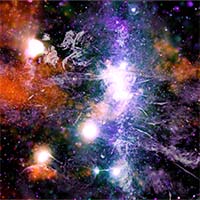 Threads of superheated gas and magnetic fields are weaving a tapestry of energy at the center of the Milky Way galaxy. A new image of this new cosmic masterpiece was made using a giant mosaic of data.
Threads of superheated gas and magnetic fields are weaving a tapestry of energy at the center of the Milky Way galaxy. A new image of this new cosmic masterpiece was made using a giant mosaic of data.
May 27th, 2021
Read more
 Finding a galaxy lacking dark matter is an extraordinary claim that challenges conventional wisdom. It would have the potential to upset theories of galaxy formation and evolution.
Finding a galaxy lacking dark matter is an extraordinary claim that challenges conventional wisdom. It would have the potential to upset theories of galaxy formation and evolution.
 Subscribe to our Space Exploration News feed
Subscribe to our Space Exploration News feed















